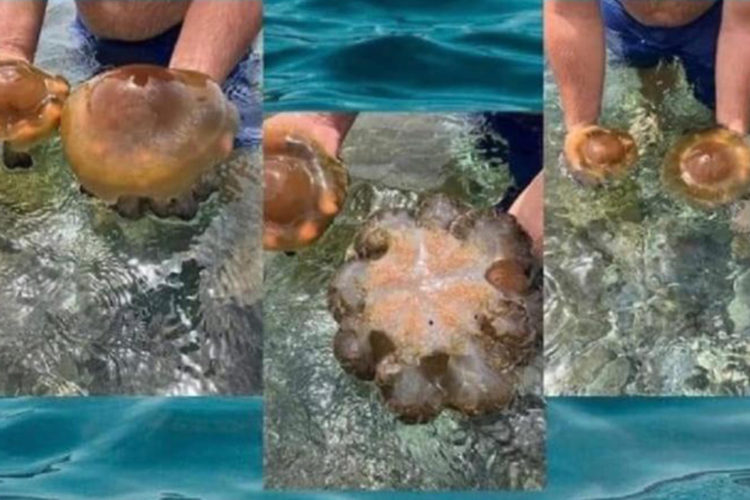'Fried egg' jellyfish choose the beaches of Ceuta
So far this summer season, this species has appeared on several occasions on the coast of Ceuta
This past weekend there was a new sighting of the 'fried egg' jellyfish on the beaches of Ceuta. A bather raised the alarm in the Tarajal area, where a few minutes later the Marsave team acted effectively. “We asked a biologist to offer us information and after that, we followed the instructions which were to throw it back into the sea,” explains one of the lifeguards.
The solution was this, there was no other. But it did fuel the uncertainty of those present because this was the second time, at least known, that it happened during the summer season.
“In Ceuta it is not common for this species to appear so often,” says Francisco Javier Martínez, Obimasa biologist. Scientifically, these invertebrate animals are called 'Cotylorhiza tuberculata', which have also made an appearance in the area of Murcia, Melilla and Almería this summer. “This must be a phenomenon on a regional scale, in the Alboran Sea and the Mediterranean. This year they will have had a strong population increase,” explains the specialist, making it clear that “they are harmless” and that “they should be left in the water.”
“The bite does not have a significant risk, its arms are slightly stinging”
If this marine animal is so rejected for one reason, it is because of its sting, which in reality does not cause serious problems for people.
From this research to which mention is made and under the criteria of Francisco Javier Martínez, 'Cotylorhiza tuberculata' is not poisonous. “He has no significant risk, his arms are slightly stinging. But it depends on the person or the part of the body,” explains the biologist. However, those who do have to be a little more cautious are those users who suffer from “more or less sensitive skin.”
As for the characteristics, they can reach 30 centimeters in diameter and consist of eight tentacles, being considered one of the two largest species seen along the Mediterranean coast.
The people of Ceuta look at the beaches with a magnifying glass, although "they should not be afraid because if these polyps appear on more occasions, they will do so in isolation." These two have been specific cases, so they should not lead to fear among bathers. For the remainder of the summer, the mackerel can bathe in complete peace of mind.
Despite this, the Obimasa biologist comments that "they must be kept in the aquatic environment because they have to fulfill their ecological function." That is, these “are important in the marine ecosystem. They fulfill a vital function in the food chain, since they are food for sea turtles and other species,” says Martínez.
On the other hand, “they become a refuge for fry of horse mackerel, serious, salemas and bogas, among others. These young fish are immune to its poison and find in jellyfish a way to hide from other predators and go unnoticed."



No hay comentarios:
Publicar un comentario